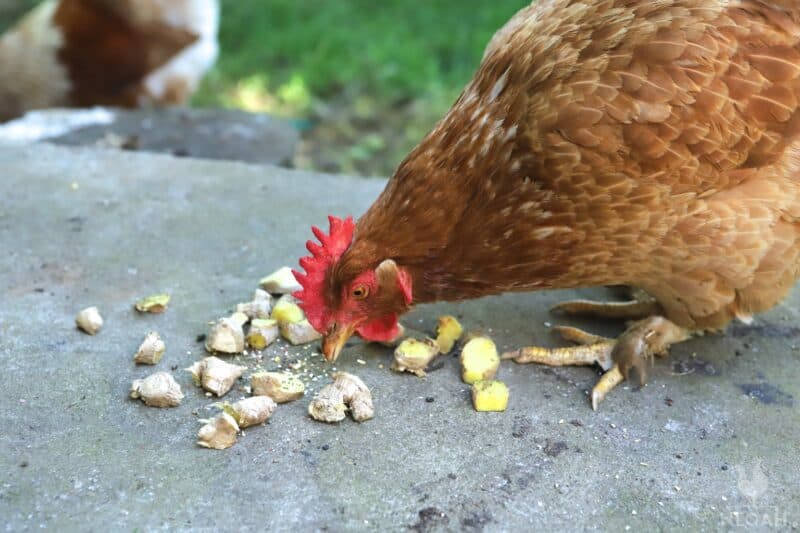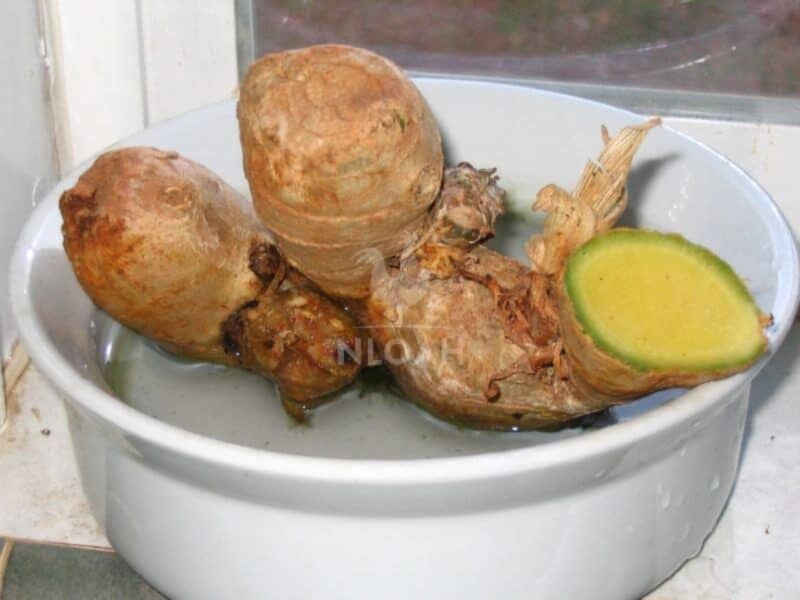When you stop to think about it, it is pretty amazing just how many different things chickens can eat.
Of course, we all know they’re omnivores, but I think it’s a little funny that they can eat some things safely that they would practically never be able to get in the wild. Lots of novel foods actually turn out to be quite healthy for chickens, too…

How about ginger? Can chickens eat ginger root?
Yes, chickens can eat ginger root. Chickens generally like it, and it is quite nutritious and has several benefits including an improvement in digestive health, and an increase in egg quality.
Ginger has long been used as folk medicine around the world, and has been proven to have some pretty significant health benefits for people.
Turns out it also has similar benefits for chickens, aside from being nutritious.
Ginger is also easy to incorporate in their existing diet, even if you have some fussy eaters in your flock so there’s no reason not to.
Keep reading and we’ll tell you everything you need to know about feeding Ginger to your chickens.
Nutritional Profile of Ginger
Ginger is the rhizomatic root of a perennial flower, one that has been used for a very long time as a kitchen spice and also in various traditional medicine systems around the world.
Aside from its special qualities, ginger is also pretty nutritious just like a root vegetable, and it has a varied and solid assortment of vitamins and minerals along with a little bit of protein and plenty of carbohydrates.
Taking a look at the vitamins first, we see that it has a great amount of vitamin B6, plenty of vitamin C, vitamin B3, B5, B1, and even some folate. This is rounded out by a little bit of vitamin E.
| 100g Ginger Root | Amount |
|---|---|
| Water | 78.9 g |
| Energy | 80 kcal |
| Energy | 333 kJ |
| Protein | 1.82 g |
| Total lipid (fat) | 0.75 g |
| Ash | 0.77 g |
| Carbohydrate, by difference | 17.8 g |
| Fiber, total dietary | 2 g |
| Sugars, total including NLEA | 1.7 g |
| Calcium, Ca | 16 mg |
| Iron, Fe | 0.6 mg |
| Magnesium, Mg | 43 mg |
| Phosphorus, P | 34 mg |
| Potassium, K | 415 mg |
| Sodium, Na | 13 mg |
| Zinc, Zn | 0.34 mg |
| Copper, Cu | 0.226 mg |
| Manganese, Mn | 0.229 mg |
| Selenium, Se | 0.7 µg |
| Vitamin C, total ascorbic acid | 5 mg |
| Thiamin | 0.025 mg |
| Riboflavin | 0.034 mg |
| Niacin | 0.75 mg |
| Pantothenic acid | 0.203 mg |
| Vitamin B-6 | 0.16 mg |
| Folate, total | 11 µg |
| Folate, DFE | 11 µg |
| Choline, total | 28.8 mg |
| Vitamin E (alpha-tocopherol) | 0.26 mg |
Looking at the minerals, we see that there is plenty of magnesium and manganese to be had on a good amount of potassium, phosphorus, and iron along with a little calcium and zinc.
Ginger contains very little sodium and is roughly 80% water by weight.
Aside from this, ginger contains a variety of compounds that function as antioxidants and also provide other special health benefits. See the next section.

Benefits of Ginger for Chickens
Ginger can do an awful lot for your flock. Just looking at the nutritional content is enough to make its inclusion in the diet of your chickens worthwhile.
This is also true for various B complex vitamins that help with everything from processing energy and cellular maintenance to growth and regeneration of nervous system tissue.
The folate present in ginger has some interesting benefits, and vitamin E plays an important part in skin and feather health.
The mineral content shouldn’t be overlooked either. Manganese is vital for skeletal health, iron is critical for circulatory health.
Chickens need iron for the production of new red blood cells, and calcium as always is absolutely vital for producing strong, healthy egg shells in laying hens, and also for the maintenance and healing of the chicken’s own skeleton.
But it is the special compounds present in ginger, in the form of shogaol and gingerol, that might be the most interesting…
Ginger has been proven in scientific study to improve the egg quality of chickens, specifically the presence of antioxidants in the yolks, and also digestive and general gut health.
It does this by reducing inflammation of the digestive tract, and improving overall function, helping chickens get the most out of all the other food that they eat.
Very impressive benefits coming from a humble root!
Can Chickens Eat Ginger Raw?
Yes, chickens can eat raw ginger and this is the preferred way to feed it to them since it maximizes the nutritional content and the presence of the beneficial compounds discussed above.
As ginger is dried or cooked the amounts of these compounds begin to lessen, and although they are still beneficial they won’t be as beneficial as they would be if they were fresh.
However, ginger root is hard and dense, and only you’re more hardcore eaters are probably going to spend much time on it unless you prepare it properly. More on that later.
Can Chickens Eat Ginger Leaves?
Yes, chickens can eat ginger leaves. Ginger as we know it in the kitchen is the root of a plant, one with above-ground stems and leaves. Chickens can eat both safely!
Can Chickens Eat Ginger Cooked?
Yes, your chickens can eat cooked ginger and they seem to prefer it when it is softened up. Do note that, just like drying it, cooking it will reduce its nutritional value somewhat and in proportion to how long it is cooked.
Remember to feed your chickens raw ginger to maximize the health benefits.
Never Feed Ginger to Chickens that Has Been Prepared with Harmful Ingredients
Since we brought up cooking, I should take a moment to caution you against feeding your chickens any Ginger that is prepared with harmful ingredients that they can’t have, or feeding them any dish that has ginger in it containing the same.
Just because you and I might like a great big plate of Thai noodles loaded with ginger or a peach cobbler made with ginger and all the other “warm” spices we have doesn’t mean it’s okay for your chickens.
First off, things like salt, butter, sugar, excess oil, sauces, and so forth are just bad news for your chickens.
There’s a high likelihood that eating these things can make your chickens sick or even cause life-threatening conditions.
Salt poisoning, high blood pressure, heart problems, kidney problems, fatty liver syndrome, and more are all possibilities, and all are a very bad way for a chicken to die just because you wanted to share some of your food with them.
Don’t risk it. If you’re going to give your chickens ginger they will love it just as much all by itself or mixed in with food that they can have.
Beware of Pesticide on Grocery-bought Ginger
One thing to be cautious of if you are purchasing whole ginger root at the grocery store is the presence of pesticides.
Ginger, like pretty much all produce these days, is likely going to be treated with pesticide while it is growing in order to ensure that it will actually make it to market intact.
This can be a serious problem for your chickens because chickens, like most birds, show a marked sensitivity to chemical toxins.
Accordingly, it’s in your best interest to purchase all-natural, pesticide-free organic ginger if possible, or just grow your own if you can.
Remember that ginger is a root vegetable, and simply washing it or peeling it is unlikely to remove all the pesticides that may be absorbed into the flesh.
How Often Can Chickens Have Ginger?
Ginger is good for chickens and they can have it regularly but it should not be a staple or mainstay in their diet.
Ginger works best as a supplement, fed to them mixed into other food a couple of times a week.
Preparing Ginger for Your Flock
Giving ginger to chickens might be a little bit tricky because it is so hard. I mean the root itself is dense, tough!
Some adventurous chickens will peck and peck at it to take bites out of it, but smaller or weaker birds probably aren’t going to bother.
You’ll need to prep it for them for the best results and to encourage them to eat it.
The good news is that ginger grates very easily, and this makes it perfect for mixing into all sorts of other food, be it their chicken feed or something else.
Your chickens will love the taste, and the fine pieces of ginger will be easy for them to eat when served this way.
But if that’s not something you want to mess with, you can cut it up into small cubes or tidbits and your chickens should tuck into it just the same.
Can Baby Chicks Have Ginger, Too?
Chicks can have ginger, but you probably want to wait until they are out of the brooding phase before giving it to them, that’s about 8 weeks old.
Ginger is definitely healthy for chickens and it can do the same thing for chicks, but the stuff is pretty intense and chicks are very sensitive to upset stomachs when they are small.
You are always advised to feed your chicks only starter feed during the earliest part of their life, and introduce whole foods and small treats much later and even then sparingly. Let them grow up a little bit before giving them ginger.
Tom has lived and worked on farms and homesteads from the Carolinas to Kentucky and beyond. He is passionate about helping people prepare for tough times by embracing lifestyles of self-sufficiency.
